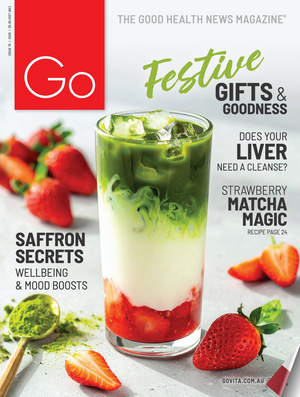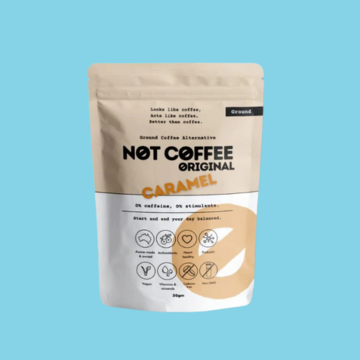Written By  Go Vita
Go Vita
blog
Winter Wellness: Stay Healthy, Energised, and Resilient Through the Cold Months


Winter Wellness: Stay Healthy, Energised, and Resilient Through the Cold Months
Winter doesn’t have to mean feeling run-down. With a little planning, you can stay well.
As the cooler months arrive and the days grow shorter, many people notice a drop in energy, an increase in colds or flu, and even seasonal dips in mood. But winter doesn’t have to mean feeling run-down. With a little planning, you can stay well and feel strong by focusing on good nutrition, quality rest, regular movement, immune-supportive nutrients, and mindful sun exposure.
Nourish Your Body with Seasonal Produce
Nutrition is the cornerstone of winter wellness, and eating seasonally helps you get the most out of nature’s offerings during the cooler months. In Australia, the combined autumn and winter harvest provides a rich variety of immune-supportive fruits and vegetables to help you stay healthy, energised, and resilient.
Fruits like apples, pears, figs, custard apples, citrus (oranges, mandarins, grapefruits), kiwifruit, and avocados are all in season through autumn and winter, delivering essential vitamins—particularly vitamin C—and a good dose of fibre and antioxidants. On the vegetable front, there’s an abundance of nourishing options including green beans, beetroot, broccoli, cabbage, carrots, potatoes, parsnips, swedes, and dark leafy greens like spinach and kale.
Incorporating this seasonal produce into your daily meals ensures you're getting a wide range of nutrients that support immune function, digestion, and overall vitality. Think hearty soups, roasted vegetables, fresh citrus snacks, and leafy green stir-fries—perfect comfort food with a health-boosting edge.
A colourful, whole-food diet helps support your immune system, balance energy levels, and maintain a healthy gut. Minimise processed foods and refined sugars, which can weaken your immune defences and leave you feeling sluggish.
Prioritise Rest and Quality Sleep
Shorter days and colder temperatures often make us feel sleepier—and that’s perfectly natural. Your body needs adequate rest to repair, regenerate, and fight off infection. Aim for 7–9 hours of quality sleep each night. Establish a calming bedtime routine and limit screen time before bed to support deeper rest.
Keep Moving and Get Outdoors
Even if its cold outside, regular movement is essential for physical and mental health. Exercise helps stimulate circulation, support immune function, and release mood-boosting endorphins. Aim for 30 minutes of moderate activity most days—whether that’s walking, stretching, yoga, or home workouts.
Also, try to get outdoors daily for a dose of fresh air and natural light. It’s a great way to reduce stress and support your circadian rhythm, which affects both sleep and mood.
Natural Sunlight and Vitamin D: Get the Balance Right
Vitamin D is vital for immune health, mood, and bone strength. But in winter, our exposure to sunlight naturally decreases—especially since we tend to cover up more and spend more time indoors.
It’s important to note that Australians shouldn’t expose themselves to harmful UV radiation just to get more vitamin D. According to Cancer Council Australia:
• When UV levels are below 3, sun protection isn’t needed unless you're outdoors for extended periods or near reflective surfaces like snow or water.
• When UV levels reach 3 or higher, sun protection is essential—even in winter. Prolonged exposure won’t increase vitamin D levels but can increase the risk of skin cancer.
Most Australians get enough vitamin D with just a few minutes of sun exposure on the face, arms, or hands while doing everyday tasks—such as walking, gardening, or hanging laundry.
If you suspect you’re low in vitamin D, it’s best to speak with a healthcare professional who may recommend a blood test and supplementation if necessary.
Support Your Immune System with Key Nutrients
Winter is a great time to boost your diet with nutrients known to support immune health:
• Vitamin C: Essential for white blood cell function and an effective antioxidant. Found in citrus fruits, capsicum, kiwi, and broccoli.
• Vitamin D: Helps regulate immunity and mood. Found in fatty fish, fortified dairy, eggs—and naturally produced in your skin with safe sun exposure.
• Zinc: Supports immune response and can reduce the length of colds. Found in red meat, shellfish, pumpkin seeds, legumes, and whole grains.
• Quercetin: A powerful antioxidant found in apples, onions, grapes, and green tea. Often paired with vitamin C and zinc in supplements for enhanced absorption and immune support.
Consider Supplements — But Get Professional Advice First
While food should always come first, some people may find it difficult to get adequate levels of vitamin D, zinc, vitamin C, or quercetin from diet alone—especially in winter. This may be due to dietary restrictions, limited sun exposure, or increased stress and immune demands.
If that sounds like you, it’s a good idea to speak to a healthcare professional. They can guide you on whether supplementation is right for you, and recommend safe, effective doses that meet your needs.
Avoid self-dosing without professional advice, especially with fat-soluble vitamins like vitamin D, which can build up in the body.
Staying healthy through winter doesn’t require drastic changes—it’s about consistently supporting your body with what it needs. Eat seasonally and colourfully, prioritise good sleep, keep moving, get fresh air and sunlight when possible, and be smart about supplementation.
With a few mindful habits, you can face the colder months feeling energised, supported, and resilient—ready to enjoy everything winter has to offer.
Information presented is for information purposes only and is not intended to replace advice or treatment from qualified healthcare professionals. The information is not intended to treat or diagnose. Always consult your healthcare professional before taking nutritional or herbal supplements. If you are pregnant, breastfeeding, have any allergies or diagnosed conditions, or are taking prescription medications, always consult your healthcare professional before taking nutritional or herbal supplements.
Binge Read on these

Christmas Gift Ideas

Refreshing Cranberry Spritzer

Gearing Up for a Sober Summer

Go Mag Issue 75
Discover the latest issue of Go Mag – Issue 75, your go-to guide for natural health, wellbeing...

Christmas Gift Ideas

Refreshing Cranberry Spritzer

Gearing Up for a Sober Summer

Go Mag Issue 75
Discover the latest issue of Go Mag – Issue 75, your go-to guide for natural health, wellbeing...

